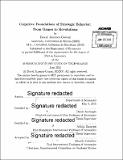| dc.contributor.advisor | Daron Acemoglu and Abhijit Banerjee. | en_US |
| dc.contributor.author | Jiménez Gómez, David, Ph. D. Massachusetts Institute of Technology | en_US |
| dc.contributor.other | Massachusetts Institute of Technology. Department of Economics. | en_US |
| dc.date.accessioned | 2015-09-17T19:05:07Z | |
| dc.date.available | 2015-09-17T19:05:07Z | |
| dc.date.copyright | 2015 | en_US |
| dc.date.issued | 2015 | en_US |
| dc.identifier.uri | http://hdl.handle.net/1721.1/98690 | |
| dc.description | Thesis: Ph. D., Massachusetts Institute of Technology, Department of Economics, 2015. | en_US |
| dc.description | Cataloged from PDF version of thesis. | en_US |
| dc.description | Includes bibliographical references (pages 155-164). | en_US |
| dc.description.abstract | Game theory is one of the main tools currently used in Economics to model strategic behavior. However, game theory has come under attack because of the strong assumptions it makes on people's behavior. Because of that, alternative models of bounded rationality, with more realistic assumptions, have been proposed. In the first chapter, I develop a game theoretic model where players use two different reasoning processes: cooperative and competitive. The model generalizes Level-k and team reasoning, and provides a unified explanation for several important phenomena. In Rubinstein's Email game, players coordinate successfully upon receiving enough messages. In 2 x 2 games of complete information, the solution concept lies between Pareto dominance and risk-dominance. In coordination games, the model explains several experimental facts that cannot be accounted for by global games, especially the fact people coordinate more with public rather than private information. I show the importance of public events in revolutions: a self-interested government prevents the generation of common knowledge among the citizenry when times are bad. In the second chapter, I develop a model of cognitive type spaces which incorporates Level-k and Cognitive Hierarchy (CH) models into games of incomplete information. CH models make two assumptions: agents of higher level have richer beliefs and can perform more computations. In my model, like in Level-k and CH models, an agent's level determines how complex her beliefs are. However, given their beliefs, agents are fully rational and behave according to Interim Correlated Rationalizability. My main result is that, restricted to cognitive type spaces, the product topology and the uniform strategic topology coincide, what implies that two players with similar beliefs behave similarly. This means that, unlike for general type spaces, predictions will be robust to small specification errors and suggests that incorporating cognitively plausible assumptions into game theory can increase robustness. As an application, I show that in the Email game, when players receive few messages they never attack; however, when they receive enough messages, they behave as if there was complete information, and both actions are rationalizable. In the third chapter, I develop a dynamic model of forward-looking agents in the presence of social pressure. I show that social pressure is effective in generating public good provision: after an agent starts contributing to the public good, other agents decide to contribute as well because of fear of being punished, what generates contagion in the network. In contrast with the previous literature, contagion happens fast as part of the best response of fully rational individuals. The network topology has implications for whether the contagion starts and the extent to which it spreads. I find conditions under which an agent decides to be the first to contribute in order to generate contagion in the network, as well as conditions for contribution due to a self-fulfilling fear of social pressure. | en_US |
| dc.description.statementofresponsibility | by David Jimenez-Gomez. | en_US |
| dc.format.extent | 164 pages | en_US |
| dc.language.iso | eng | en_US |
| dc.publisher | Massachusetts Institute of Technology | en_US |
| dc.rights | M.I.T. theses are protected by copyright. They may be viewed from this source for any purpose, but reproduction or distribution in any format is prohibited without written permission. See provided URL for inquiries about permission. | en_US |
| dc.rights.uri | http://dspace.mit.edu/handle/1721.1/7582 | en_US |
| dc.subject | Economics. | en_US |
| dc.title | Cognitive foundations of strategic behavior : from games to revolutions | en_US |
| dc.type | Thesis | en_US |
| dc.description.degree | Ph. D. | en_US |
| dc.contributor.department | Massachusetts Institute of Technology. Department of Economics | |
| dc.identifier.oclc | 920687121 | en_US |
